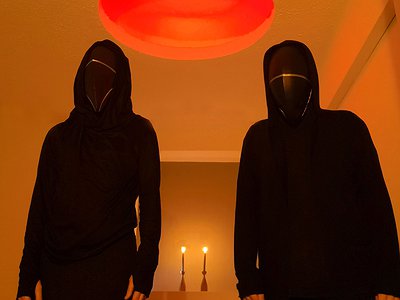Could you take us through a day in your life, from a possible morning routine through to your work? Do you have a fixed schedule? How do music and other aspects of your life feed back into each other - do you separate them or instead try to make them blend seamlessly?
There is no fixed routine, it is all very nicely chaotic. There is constant communication, a silent allocation of work that needs to be done. It goes on 24 hours.
Could you describe your creative process on the basis of a piece or album that's particularly dear to you, please? Where did the ideas come from, how were they transformed in your mind, what did you start with and how do you refine these beginnings into the finished work of art?
Ideas come and go in our heads constantly, it could be details about an already existing piece or a whole concept etc. And then in rehearsals these ideas become sound and this is where they are transformed, they get infected by the virus that is language and end up being something entirely different. The struggle is to bypass language somehow and sometimes this happens when we leave words behind and work only with sound. It is a process that we are trying to describe through language while writing this answer and already feel we are failing.
There are many descriptions of the ideal state of mind for being creative. What is it like for you? What supports this ideal state of mind and what are distractions? Are there strategies to enter into this state more easily?
There is no other alternative than to aim to stay creative at all costs. Survival is not a walk in the park (especially for practitioners of experimental music) but it is secondary and the only struggle is to not perceive it as a distraction but - on the contrary - as a driving force. We would not even call it a strategy but a hardwiring effect that keeps the mind hungry.
How is playing live and writing music in the studio connected? What do you achieve and draw from each experience personally? How do you see the relationship between improvisation and composition in this regard?
Apart from the absence of an audience and the particularities of the venue, it is more or less the same thing. We record most of the music in a live situation with minimal overdubs and polishing in order to be able to deliver the same sound in both situations. This however, does not make any sense since the use of the low frequencies can easily be chaotic depending on the properties of a room or a sound system… So, we leave the improvisation to the medium rather than involve it in the compositional process.
How do you see the relationship between the 'sound' aspects of music and the 'composition' aspects? How do you work with sound and timbre to meet certain production ideas and in which way can certain sounds already take on compositional qualities?
The development of our work has the form of a wave. It is also a result of diving into the cells using a microscope and then zooming out again in order to incorporate the findings in the big picture. We started as lots of people do, with a more classical approach to music and then just concentrated on pure sound and its qualities. We barely improvise, the last period finds us using the sound research findings to shape our new musical approach.
Our sense of hearing shares intriguing connections to other senses. From your experience, what are some of the most inspiring overlaps between different senses - and what do they tell us about the way our senses work? What happens to sound at its outermost borders?
Sound is vibration but it is all about time; expanding sound creates energy and changes the temperature and the way things smell, it can be soothing and it can hurt too.
Art can be a purpose in its own right, but it can also directly feed back into everyday life, take on a social and political role and lead to more engagement. Can you describe your approach to art and being an artist?
An artist is like any other person. Some like to think artists are different than other people, more ‘sensitive’ more ‘creative’ more ‘insightful’ and other nonsense like that. But artists are no different, they live, create and shape society as much as anyone else whatever that means. They have the same problems as anyone else. The only difference is they chose a better job but with higher financial risk.
It is remarkable, in a way, that we have arrived in the 21st century with the basic concept of music still intact. Do you have a vision of music, an idea of what music could be beyond its current form?
Not only it is intact, it is boring most of the time too. Music is just a manifestation of sound and sound is vibration and time.
Interviews / About
Fifteen Questions Interview with MMMΔ
The Monster in the Machine
Part 2

"An artist is like any other person. Some like to think artists are different than other people, more ‘sensitive’ more ‘creative’ more ‘insightful’ and other nonsense like that. But artists are no different, they live, create and shape society as much as anyone else whatever that means."

